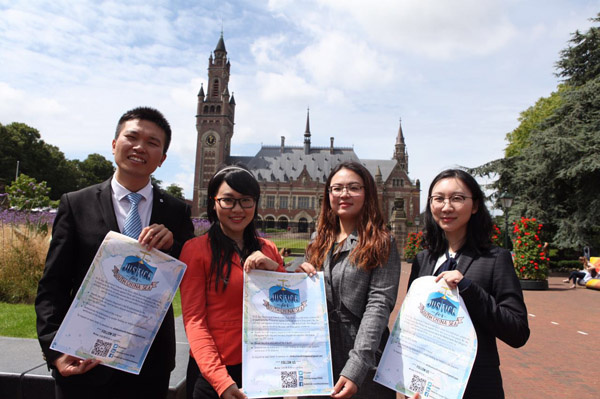
Overseas scholars of international law hold copies of the United Nations Convention on the Law of the Sea (UNCLOS) in hands in front of the Peace Palace in Hague, Netherlands on July 8, 2016. They try to seek justice of the international law by publicizing an open letter about scholars' professional stance on the South China Sea case. (Photo by Fu Jing/China Daily)
International courts and tribunals,
State Parties to the UNCLOS,
Scholars, students, and lawyers of international law,
All supporters to the peaceful settlement of disputes,
At the issuance of the final award of the South China Sea Arbitration (the Arbitration), we, the undersigned scholars and students of international law, hereby emphasize that the ad hoc Arbitral Tribunal (the Tribunal) has no jurisdiction over the relevant disputes, and that the Award has no binding force.
Below, we clarify that state consent is the basis of the compulsory arbitration under the United Nations Convention on the Law of the Sea (the UNCLOS). We then demonstrate that the real disputes between China and the Philippines and those under the Arbitration are disputes over territorial sovereignty and maritime delimitation, for which there is no mutual state consent to the compulsory jurisdiction. We also show how the Philippines and the Tribunal have exceeded mutual state consent. Finally, we show that the Arbitration is neither binding nor helpful to the settlement of disputes in the South China Sea. We argue and state as follows:
I. State consent as the basis of the compulsory arbitration
There is no supra-national international judicial or arbitral organ. These international organs are established under state consent, as reflected in relevant treaties, compromis and resolutions of the UN Security Council. Thus, state consent constitutes the legal basis for these organs and defines their competence. Within the scope of state consent, an organ is legitimate. If it oversteps this scope, its legitimacy has no legal basis. Compulsory arbitration and other compulsory procedures under the Convention, as agreed upon by more than 160 countries in nine years' negotiation, are strictly based on state consent.
Going through the UNCLOS carefully, one will easily find how state consent defines the applicability of compulsory procedures, including compulsory arbitration. First, these procedures are authorized only for disputes concerning the interpretation and application of the Convention (Article 286). Hence, without mutual state consent, an arbitral tribunal cannot address territory disputes. Second, parties to maritime disputes can agree upon the means to settle their dispute and to exclude any further procedure, including the UNCLOS procedures, such as the compulsory arbitration (Articles 281, 282). Third, States are entitled to declare that they do not accept compulsory procedures with respect to maritime delimitation disputes and other disputes involving vital national interests (Article 298). Compulsory procedures are subject to such declarations.
With such declarations, relevant dispute may be submitted to compulsory procedures only by agreement of the parties to the dispute (Articles 286, 299). So far, 35 States, including China, have made such declarations. Fourth, negotiation and exchange of views are prior requirements to trigger compulsory procedures (Articles 279, 283, 286).
The above-mentioned limitations, exceptions and prior requirements are the major limits of state consent, which define the extent of jurisdiction of the judicial and arbitral organs under the UNCLOS. If an organ acts beyond this limits, its legitimacy will have no legal basis. It is notable that, by recognizing the "competence-competence" (a court/tribunal's power to decide on disputes as to whether it has jurisdiction; Article 288.4), the UNCLOS indicates no intention to reduce the above limits and to grant additional power. The "competence-competence" must also be exercised within the limits of state consent.
II. The real disputes in the Arbitration are territorial dispute and maritime delimitation
There are solid legal bases for China's sovereignty over the Dongsha Islands, Xisha Islands, Zhongsha Islands and Nansha Islands in the South China Sea (hereinafter collectively referred to as the SCS Islands) and the adjacent waters. The Chinese people were the first to discover, name and develop these Islands, and China's original title thus acquired has been maintained by its continuous and peaceful display of sovereignty ever since. In addition, China's sovereignty over these Islands is also reflected in the 1943 Cairo Declaration, the 1945 Potsdam Declaration and subsequent international legal documents.


















































